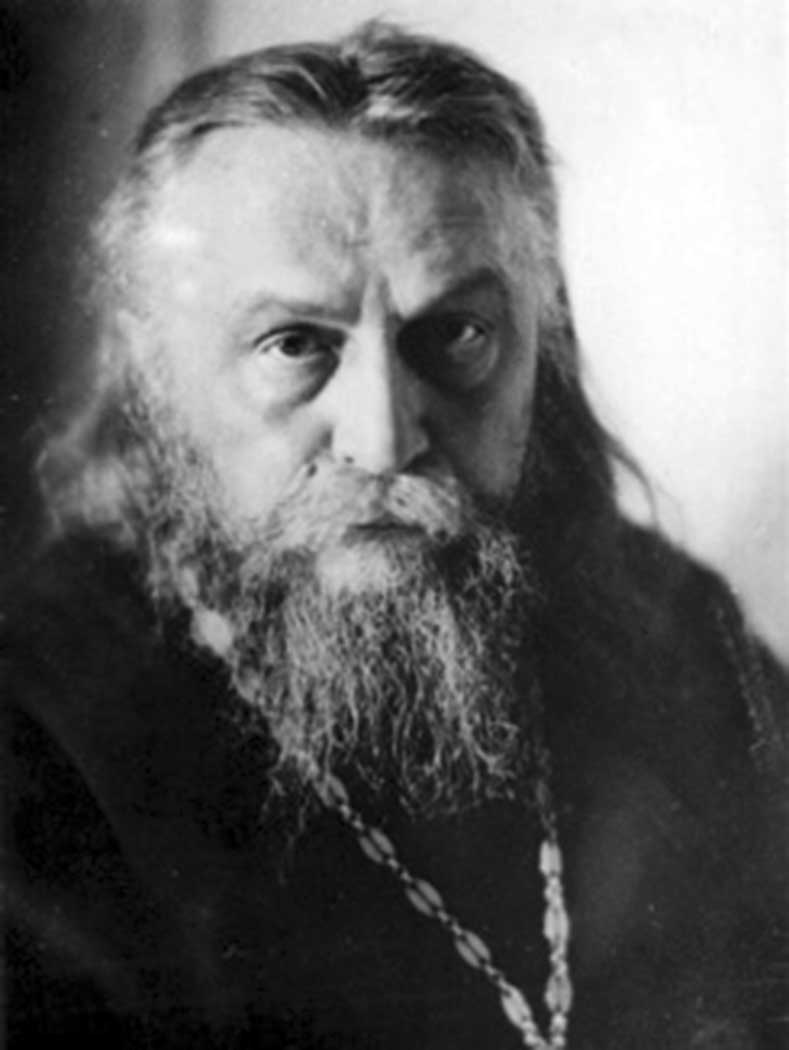Listes des autres pages théologiens et philosophes
- Archpriest Sergius Boulgakov
- Protopresbyter Alexis Kniazeff
- Archimandrite Cyprian Kern
- Protopresbyter Basile Zenkovsky
- Protopresbyter Alexander Schmemann
- Protopresbyter Boris Bobrinskoy
- Olivier Clément
- Protopresbyter John Meyendorff
- Leon Zander
- Archpriest Georges Florovsky
- Vladimir Ilyine
- Bishop Cassian (Bezobrazoff)
- Protopresbyter Nicholas Afanassieff
- Anton Kartachov
- George Fedotov
- Boris Vycheslavtsev
Page information
Page information
Archpriest Sergius Boulgakov

Archpriest Serge Boulgakov
Auteur inconnu (DR)
Born into an Orthodox family in 1871, Sergius Boulgakov studied at the seminary of Orel, in western Russia. In 1894, he graduated in law from the University of Moscow, where he took courses in political economy.
He began to take an interest in Marxism and participated in the meetings of the Study Group on Marxism, but deviated more and more from it as he deepened his reading of Karl Marx. More sensitive to the writings of Vladimir Soloviev, Leon Tolstoy and Fyodor Dostoyevsky, he published in 1903 a book which sums up his thought, "From Marxism to Idealism".
He was then considered one of the leaders of the idealist movement and began to write articles on politics and economics in the journals Nouvelle Voie (Новый Путь) and The Questions of Life (Вопросы Жизни). In 1906, he was elected to the Duma under the label of independent Christian Socialists.
Between 1911 and 1917, he directed the editions “La Voie”, which published several works on Orthodox theology. He then devoted himself to two essays which would mark their era: "The philosophy of economics" (Философия хозяйства), in 1912, and "The Light without decline" (Свет Невечерний) in 1917, in which he associated his conception of faith and the sophiology of Soloviev, a conception which aroused a theological controversy.
Ordained priest of the Russian Orthodox Church in 1918, Bulgakov condemns the October Revolution and then publishes "At the banquet of the gods" (На пиру богов), which exposes his criticisms. He went into exile in Crimea during the civil war and published two essays, "Philosophy of the Name" (Философия имени) and "The Tragedy of Philosophy" (Трагедия философии) in 1920. He considers that Christian conceptions cannot be expressed than by dogmatic theology. Tempted then by a common rejection of the political and religious destiny of Russia, he writes "Under the ramparts of Chersonese" which he will not publish and which shows by his rejection of Byzantinism a great proximity with Vladimir Soloviev’s "Russia and the universal Church ". But the rest of his exile cooled his admiration for Catholicism.
In December 1922, he was expelled by the Bolshevik government along with 160 other intellectuals on "the ship of the philosophers". He moved to Prague, where he taught theology at the Russian Research Institute. Two years later he participated in the creation of the Saint-Serge Orthodox Theological Institute in Paris. He was responsible for it for a while and gave courses in dogmatic theology.
About Father Serge Boulgakov, director of the Saint Sergius Theological Institute (in French)
Father Alexis Kniazeff, Father Elie Melia, Constantin Andronikov and Valentine Zander tell us about Father Bulgakov in the program Orthodoxie below, broadcast on May 5, 1974.
Father Bulgakov died of a stroke on July 12, 1944. He was later recognized for his defense of the ecumenical cause.
His funeral was organized at the Saint-Alexandre-Nevsky cathedral, rue Daru, in Paris.
On November 9, 1969, Stanilas Fumet, Olivier Clément, Wladimir Weidle were interviewed on France Culture (radio show underneath, in French). They detail the personality of the historian and his philosophical thought, the influence of Marxist thought in his youth and his return to the Christian faith, the love of God and of men.
Works translated into French
- Icône Sophia, la Sainte Sagesse et la syzygie Sophia avec Jésus-Christ, 1812.
- La Lumière sans déclin (Свет невечерний, 1917), Lausanne, 1990, 431 p.
- Sous les remparts de Chersonèse (1918, publication posthume), Труды по социологии и теологии, t. 2, Moscou, Наука, 1997, traduit en français par Bernard Marchadier, Genève, Ad Solem, 1999, 291 p.
- La petite trilogie: Le Buisson ardent (1927), trad. Constantin Andronikof, Lausanne, L'âge d'homme, 1987. L'Ami de l'époux. de la vénération orthodoxe du Précurseur (1928), Lausanne. L'Échelle de Jacob (1929), Lausanne, 1987, 151 p.
- La grande trilogie : Du verbe incarné, Agnus Dei (Агнец Божий. L'agneau de Dieu, 1933), Lausanne, 1981. Le Paraclet, Paris, Aubier 1946 (reprint: Lausanne, 1996). L'Épouse de l'Agneau. La création, l'homme, l'Église et la fin (Невеста Агнца, 1939, édition posthume en 1945), Lausanne, 1982.
- Philosophie du verbe et du nom, Lausanne L'Âge d'Homme 1991 (Original 1920)
- Résumé de sa sophiologie : La Sagesse de Dieu (The Wisdom of God, 1937), Lausanne, 1983.
- "Ivan Karamazov, personnage du roman de Dostoïevski Les Frères Karamazov, comme type philosophique", dans La Légende du Grand Inquisiteur de Dostoievski, commentée par Konstantin Léontiev, Vladimir Soloviev, Vassili Rozanov, Serge Boulgakov, Nicolas Berdiaev, Sémion Frank. Traduit du russe et présenté par Luba Jorgenson, éditions de L'Âge d'Homme, Lausanne & Paris, 2004, p. 289-325.
- • Héroïsme et exploit ascétique. Réflexions sur la nature religieuse de l'intelligentsia russe (PDF). In: Jalons. Paris 2011, traduit par Claire Vajou
- L'Apocalypse de Jean. Paris 2015, traduit par Anne Kichilov. Préface d'Antoine Arjakovsky
- Ma vie dans l'Orthodoxie. Notes autobiographiques. Traduction du russe par Irène Rovere-Sova et Mireille Rovere-Tsivikis. Genève 2015
- Judas Iscarioth, l'apôtre félon. Traduction du russe par Michel Niqueux. Genève 2015.